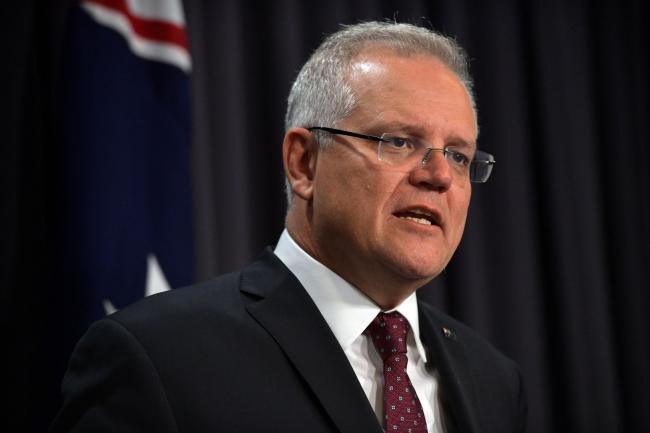(Bloomberg) -- Prime Minister Scott Morrison said he wouldn’t compromise Australia’s national security and sovereignty, as Beijing ramped up its criticism of his government and warned it against making China an enemy.
“Australia will always be ourselves,” Morrison said in a television interview Thursday with the Nine Network. “We will always set our own laws and our own rules according to our national interests -- not at the behest of any other nation, whether that’s the U.S. or China or anyone else.”
A Chinese diplomat in Canberra gave a document to Australian media outlets outlining 14 grievances and accusing the nation of “poisoning bilateral relations,” largely echoing complaints aired by the Foreign Ministry in Beijing in recent days. A Chinese government official said in a briefing with a reporter that the country was angry, and would become an enemy if it was made the enemy, according to the Sydney Morning Herald.
China is placing increased pressure on Australia through trade sanctions and reprisals as it criticizes a raft of Australian policies. While ministerial ties with the U.S. ally have been in a deep freeze since April, when Morrison’s government called for independent investigators to enter Wuhan to probe the origins of the coronavirus, the prime minister’s visit to strategic partner Japan this week to sign a new defense pact has exacerbated tensions.
Morrison, who said Thursday he had seen the “unofficial document that’s come out of the Chinese embassy,” added in the TV interview that Australia’s values, democracy and sovereignty “are not up for trade.” His government has labeled Chinese trade reprisals launched this year as “economic coercion.”
“We won’t be compromising on the fact that we’ll set what our foreign investment laws are, or how we build our 5G telecommunications networks, or how we run our systems to protect that are protecting against any interference,” Morrison said.
Morrison visited counterpart Yoshihide Suga in Toyko in his bid to build a coalition of “like-minded” democracies pushing back against what Beijing’s increasing influence in the Asia-Pacific region.
As well as agreeing to a legal framework that will allow the military of each nation to stay in the other’s country to conduct joint exercises, Morrison and Suga issued a joint statement with criticisms of Chinese policies, including their “strong opposition to any coercive or unilateral attempts to change the status quo and thereby increase tensions in the region.”
Foreign Ministry spokesman Zhao Lijian told a daily briefing in Beijing on Wednesday that the “Chinese side is strongly dissatisfied and firmly opposed to their press statement in which they accused China on the South China Sea and East China Sea issue.” The two nations “blatantly interfered in Hong Kong affairs and China’s internal affairs,” he said.
On Tuesday, Zhao gave reporters in Beijing a detailed explanation for souring ties, including Australia involving itself in domestic affairs in Hong Kong, Xinjiang and Taiwan, accusing it of spying, calling for the Wuhan probe and for rejecting “Chinese companies seeking to invest in Australia under the excuse of national security.”
Ties between the major trading partners have been strained since 2018 when Canberra barred Huawei Technologies Co. from building its 5G network and introducing anti-foreign interference laws aimed at halting Beijing’s “meddling” in domestic affairs.
“We stand up with other countries, whether it be on human rights issues or things that are happening around the world, including in China,” Morrison said. “Now if that is the source of tensions between Australia and China, well I can assure you that Australia will continue to be ourselves, we’ll continue to act in our own national interests, and pursue partnerships like the one” with Japan, which would “only strengthen stability and peace in the Indo-Pacific.”
©2020 Bloomberg L.P.

